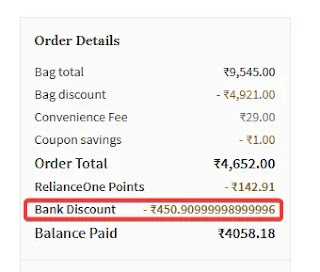I read a blog post from Gaurav Khurana suggesting on round off of a number having decimals. This is the post. What made me curious is that number and what it meant. It was a discount money having decimals. Here, the number of decimals was not restricted to two.
Gaurav, said, it is a better experience if that discount amount is restricted to two decimals and rounded up. Initially, I see, this is a fair expectation.
Here is the pic of a bill which Gaurav has shared. I'm using it here on his permission.
Interpretation of the Value and its Meaning
- The "Bank Discount" showed the below amount
- - 450.90999998999996
- The amount is in Indian Rupees
- This amount tells, it is the discount offered by the Bank on that transaction
- On round up, it will be,
- - 450.91
- If I use the round up value, then the "Balance Paid" amount will be,
- 4,058.18
- If I do not use the round up value, then the "Balance Paid" amount is still,
- 4,058.18
- If I do not use the decimal values in "Bank Discount", then Balance Paid is,
- 4,059.09
- That is, I will have to pay 0.91 rupee (91 paisa) more.
- In this case, someone is at loss. Who?
- Business?
- Customer?
- In the context of this bill, it is, customer who is paying.
- Customer will pay 91 paisa, which is, almost one rupee more.
- Now, imagine, the profit which business makes from all its customers for not having that decimal values in the amount!
- Is this right?
- When I use Bank Discount value as is with decimals.
- Or, When rounded up with two decimals.
We should have check on decimals shown and used. But, should we round up the number when it is of monetary significance and value?
Why I have this question?
- Refer to the below examples.
- 450.35
- On round up, it will be 450.5
- 450.55
- On round up, it will be 451
If the bank loses these paisa for each transactions of same customer and other customers, won't the bank is shelling out the money? Is this good?
Likewise, if I have to pay 0.15 paisa and 0.50 paisa, am I not paying more? Then, imagine the big amount that business is making by rounding up a monetary number and making its customer pay in excess.
My Thoughts on Monetary Value Round Off
- The monetary value should not be rounded up or rounded down.
- But, it can have a decimals and limited to two or to what business sees manageable.
- As Gaurav said, decimal to two digits makes life easier for all is my understanding.
- The customer need to see this monetary value.
- The generated bill or transaction should have this detail.
- When making a payment, the billing system, can show a round off value.
- And, the business should decide upon, should the amount be round up or round down

No comments:
Post a Comment
Please, do write your comment on the read information. Thank you.